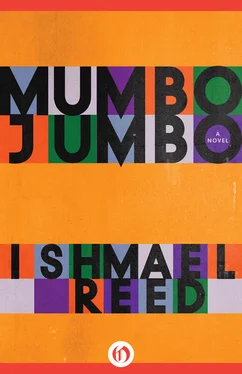Ishmael Reed - Mumbo Jumbo
Здесь есть возможность читать онлайн «Ishmael Reed - Mumbo Jumbo» весь текст электронной книги совершенно бесплатно (целиком полную версию без сокращений). В некоторых случаях можно слушать аудио, скачать через торрент в формате fb2 и присутствует краткое содержание. Год выпуска: 2013, ISBN: 2013, Издательство: Open Road Media, Жанр: Современная проза, на английском языке. Описание произведения, (предисловие) а так же отзывы посетителей доступны на портале библиотеки ЛибКат.
- Название:Mumbo Jumbo
- Автор:
- Издательство:Open Road Media
- Жанр:
- Год:2013
- ISBN:9780684824772
- Рейтинг книги:5 / 5. Голосов: 1
-
Избранное:Добавить в избранное
- Отзывы:
-
Ваша оценка:
- 100
- 1
- 2
- 3
- 4
- 5
Mumbo Jumbo: краткое содержание, описание и аннотация
Предлагаем к чтению аннотацию, описание, краткое содержание или предисловие (зависит от того, что написал сам автор книги «Mumbo Jumbo»). Если вы не нашли необходимую информацию о книге — напишите в комментариях, мы постараемся отыскать её.
Mumbo Jumbo
Mumbo Jumbo
Mumbo Jumbo — читать онлайн бесплатно полную книгу (весь текст) целиком
Ниже представлен текст книги, разбитый по страницам. Система сохранения места последней прочитанной страницы, позволяет с удобством читать онлайн бесплатно книгу «Mumbo Jumbo», без необходимости каждый раз заново искать на чём Вы остановились. Поставьте закладку, и сможете в любой момент перейти на страницу, на которой закончили чтение.
Интервал:
Закладка:
Ornamenting the desk are amusing lampoons carved in wood, ivory, and cast in bronze by African sculptors. They depict Whites who went into Africa seeking skins, ivory, spices, feathers and furs. The subjects are represented giving bribes, drinking gin, leading manacled slaves, wearing curious, outlandish hats and holding umbrellas. Their chalk-faces appear silly, ridiculous. Outstanding in the collection is the figure of a monkey-like Portuguese explorer, carved by an Angolan. He is obviously juiced and is sitting on a barrel. What side-splitting, bellyaching, satirical ways these ancient craftsmen brought to their art! The African race had quite a sense of humor. In North America, under Christianity, many of them had been reduced to glumness, depression, surliness, cynicism, malice without artfulness, and their intellectuals, in America, only appreciated heavy, serious works. (’Tis the cause, Desdemona.) They’d really fallen in love with tragedy. Their plays were about bitter, raging members of the “nuclear family,” and their counterpart in art was exemplified by the contorted, grimacing, painful social-realist face. Somebody, head in hands, sitting on a stoop. “Lawd, I’z so re-gusted.” Bert Williams had captured the Afro-American mask with Northrop Frye’s inverted U lips. But the figures on the desk, these grotesque, laughable wooden ivory and bronze cartoons represent the genius of Afro satire. They had been removed to Europe by the slavers, traders and sailors who had taken gunpowder and uniforms to Africa. They did not realize that the joke was on them. After all, how could “primitive” people possess wit. LaBas could understand the certain North American Indian tribe reputed to have punished a man for lacking a sense of humor. For LaBas, anyone who couldn’t titter a bit was not Afro but most likely a Christian connoting blood, death, and impaled emaciated Jew in excruciation. Nowhere is there an account or portrait of Christ laughing. Like the Marxists who secularized his doctrine, he is always stern, serious and as gloomy as a prison guard. Never does 1 see him laughing until tears appear in his eyes like the roly-poly squint-eyed Buddha guffawing with arms upraised, or certain African loas, Orishas.
LaBas believed that when this impostor, this burdensome archetype which afflicted the Afro-American soul, was lifted, a great sigh of relief would go up throughout the land as if the soul was like feet resting in mineral waters after miles of hiking through nails, pebbles, hot coals and prickly things. The young poet Nathan Brown, LaBas felt, was serious about his Black Christ, however absurd that may sound, for Christ is so unlike African loas and Orishas, in so many essential ways, that this alien becomes a dangerous intruder in the Afro-American mind, an unwelcome gatecrasher into Ifé, home of the spirits. Yes, Brown was serious, but the rest were hucksters who had invented this Black Christ, this fraud, simply in order to avoid an honest day’s sweat.
Papa LaBas looks over the figures again. He grins widely. Also on the table lies a book, Bronze Casting In Benin. Abdul had announced to the Race press his intention to teach a course on African sculpture to the neighborhood children. He was a hard worker. Some said he could learn a language in a week. In his own land, the land from which his ancestors had been captured during Africa’s decline, Abdul would have been royalty. A prince. Here he was ridiculed and considered eccentric, even a dangerous character. No wonder he was so bitter. Who wouldn’t be?
It was when PaPa LaBas walked into the room that he saw Abdul lying head down on his desk.
There is a letter on the desk. A pink rejection slip.
Dear Abdul:
We have read with interest the manuscript entitled “The Book of Tot,” the sacred anthology. We have decided, however, things being what they are, that we cannot publish this book. It does have that certain panache, that picaresque characterization and zestful dialogue. I was also attracted to the strange almost mystical writing. But the market is overwrought with this kind of book. The “Negro Awakening” fad seems to have reached its peak and once more people are returning to serious writing, Mark Twain and Stephen Crane. A Negro editor here said it lacked “soul” and wasn’t “Nation” enough. He suggested you read Claude McKay’s If We Must Die and perhaps pick up some pointers. Whatever, thanks for permitting us to take a peek. Later Daddy
S.S.
PaPa LaBas notices a piece of paper in Abdul’s fist. He removes it. “Epigram on American-Egyptian Cotton”
Stringy lumpy; Bales dancing
Beneath this center
Lies the Bird.
PaPa LaBas picks up the phone and calls the police. Just as he hears the 1st ring on the other end a man bopadoped into the room. It is one of the local fences. LaBas places the phone in its receiver. The man is stunned when he sees Abdul’s corpse.
Hey what’s wrong with Abdul?
He’s been murdered.
The fence’s eyes pop.
Murdered? I was just talking to him this morning and he said he had some boxes he wanted me to look at. Said the boxes were covered with jade, emeralds, jeweled bugs, birds and snakes. That Abdul…strange dude. Who do you think did it?
I don’t know, PaPa LaBas says, dialing the phone once again.
Well I guess the bulls are going to be here. I’d better leave.
The man exits.
It must have been something to do with the anthology. Disgruntled contributor or something, LaBas thinks.
The authorities answer.
Would you please send an ambulance to Abdul Sufi Hamid’s office on 125th St. and Lenox Ave.
We’ve already sent an ambulance to that place, buddy, answers the voice on the other end.
Strange, LaBas thinks, perhaps someone has already discovered the corpse and phoned. In fact he could hear the attendants carrying stretchers climbing the steps.
Monotonously, PaPa LaBas answers some routine questions. His mind is on other things.
 a handbill for the play Harlem by Wallace Thurman
a handbill for the play Harlem by Wallace Thurman
27
HINCKLE VON VAMPTON READS of PaPa LaBas’ grim discovery on the front page of the New York Sun:
HATE MONGERER MEETSWELL DESERVED END
HINT WAR BETWEEN BLACK FACTIONS
NO SUSPECTS IN MURDER OF CULTIST
MU’TAFIKAH QUESTIONED
Later Hinckle Von Vampton’s car pulls to the front of Buddy Jackson’s cabaret. It is 1 of the more famous 1s in New York City along with Percy Brown’s Gold Grabbers, Edmund’s, Leroy’s and Connie’s. The basement is an Indonesian soul food restaurant featuring such exotic numbers as:
CHICKEN IN COCONUT MILK
BAR-BE-CUED FISH
BREGEDEL DJAGUNG
FRIED PINEAPPLE.
On the 2nd floor is a theater where all the young Black actors come to recite Shakespeare, dreaming of becoming a 2nd Ira Aldridge, the famed Negro thespian.
W.W., Hubert “Safecracker” Gould and Von Vampton alight from the car and head toward the entrance of the cabaret where the review is in progress. The mulatto doorman halts their progress.
What’s wrong? queries Hinckle Von Vampton.
That man, sir, he’s a mite too dark.
Too dark? an astonished Hinckle Von Vampton replies, but isn’t this Harlem where the darkies cavort?
They cavorts, sir, but on stage; we cater to Brown Yellow and White.
That’s ridiculous, Hubert “Safecracker” Gould remarks. I’ve seen Buddy Jackson in this place and he is as black as anthracite as black as ebony as black as the abyss, an Ethiopian if there ever was.
That’s different, sir.
Читать дальшеИнтервал:
Закладка:
Похожие книги на «Mumbo Jumbo»
Представляем Вашему вниманию похожие книги на «Mumbo Jumbo» списком для выбора. Мы отобрали схожую по названию и смыслу литературу в надежде предоставить читателям больше вариантов отыскать новые, интересные, ещё непрочитанные произведения.
Обсуждение, отзывы о книге «Mumbo Jumbo» и просто собственные мнения читателей. Оставьте ваши комментарии, напишите, что Вы думаете о произведении, его смысле или главных героях. Укажите что конкретно понравилось, а что нет, и почему Вы так считаете.












